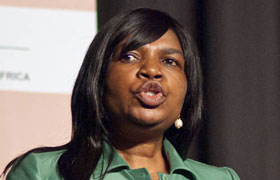
In the wake of criticism of government’s behaviour at Telkom’s recent annual general meeting, communications minister Dina Pule has moved to defend her move not to support the election or reelection of four nonexecutive directors.
In a statement, Pule says the department of communications “can’t afford to fail the SA public” and that a key concern when deciding Telkom’s strategic direction is its sustainability. Government continues to hold a direct 39,8% stake in Telkom, which many analysts have said is the behind the troubles that have beset the fixed-line operator in recent years.
In her statement, Pule says government is “learning from other countries that have gone through such wide-ranging telecoms liberalisation processes” and that Telkom has to assist in the country’s competitiveness “by upgrading its infrastructure to deliver high-speed broadband for the benefit of our economy”.
Last Wednesday, Pule and communications department director-general Rosey Sekese surprised other Telkom shareholders at the company’s annual general meeting (AGM) when government voted against the election or reelection of nonexecutive directors and against two new share incentive schemes for management. The moved was unexpected, with government having submitted a proxy vote four days before the meeting that supported all of the resolutions, including the appointment of the directors to the board.
Pule says cryptically that the decisions taken at the meeting “were informed by government’s view that corporate governance and appropriate management of state-owned companies cannot be left to just any interpretation of our expectations”.
She says that, like other businesses in which government is a key shareholder, the government’s objective is to maintain the stability and viability of Telkom, increase service delivery, adhere to corporate governance and serve as the “link between the objectives of government and the commercial imperatives” of the company.
According to Pule, her department is focused on “enhancing and protecting Telkom’s share value while balancing that with the objectives of providing affordable connectivity to all South Africans”. The department intends achieving this through “appropriate shareholder management input”.
The statement goes on to say that the vacant board seats are to be filled before the end of the year and the department expects cabinet to “pronounce on the options that are available to find a lasting and sustainable solution for Telkom’s turnaround”.
Whatever solution cabinet comes up with must ensure Telkom’s future commercial viability while also achieving SA’s “socioeconomic development objectives”.
“As we drive our mandates of digital inclusivity, we will seek to eradicate uncertainty in all the state-owned companies that report to the ministry of communications’ custodianship. Cabinet supports us in these initiatives.” — (c) 2012 NewsCentral Media




